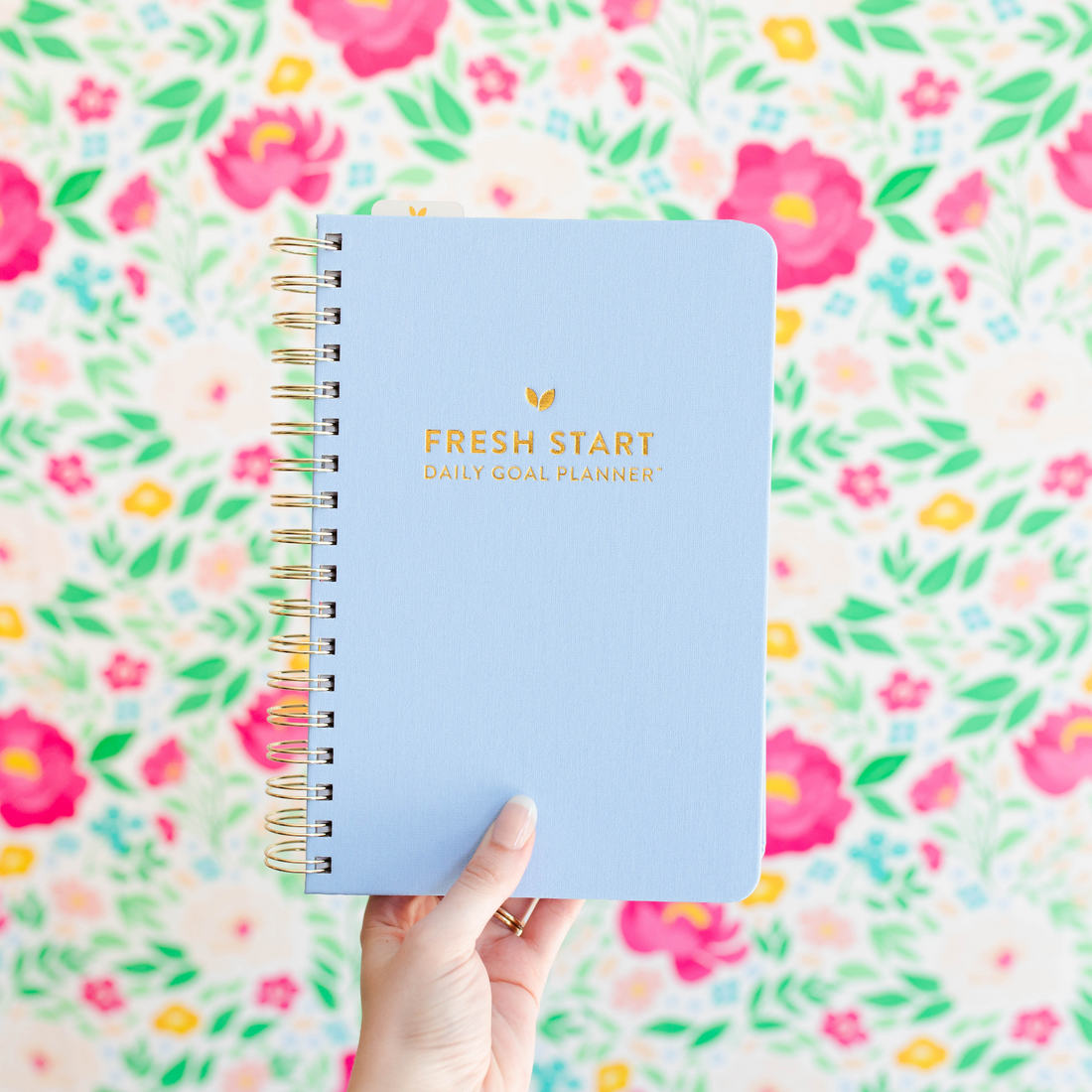Friends, we have a gift for you today! Our friend Cassie Nolin, a long-time PowerSheets user and friend to Team Cultivate, has written a guest post in honor of Disability Pride Month, which falls in July. I'm so happy for you to meet Cassie, if you're not already acquainted, and know you'll enjoy hearing her thoughts!
Have you ever felt like because of this life’s uncertainty and brokenness, you don’t even want to attempt to set a goal? Does it feel too risky to hope for something to go the way you plan? I have, and I get it.
Goal setting with a chronic illness brings unique challenges to navigate, both mental and physical. My condition changed the way I set goals (it's drastically different than how I set them when I was able-bodied). It required me to learn new things (including how to set goals with flexibility and grace!) and to grieve the way I used to set goals (I needed a fresh start).
Enter: Cultivate What Matters. There are very few planner brands that think about those who are disabled, let alone create a planner that is accessible and adaptable for those within the chronic illness community—but Cultivate What Matters does!
I'm Cassie, a six-year PowerSheets® user and recovering perfectionist. I also have a progressive chronic illness and live with medical uncertainty and brokenness, which has required me to flip the script on goal setting: through imperfect progress defined by good intentions and unchecked boxes, I’ve learned how to set goals in uncertainty. It wasn't always this way, but I love goal setting again!
It was a joy to consult with Team Cultivate as they developed the Fresh Start daily goal planner and to do so with the disabled community in mind. Today, in honor of Disability Pride Month and in honor of the diverse PowerSheets community, I'd love to highlight the features that make the Fresh Start goal planner accessible and adaptable for those with chronic illnesses and disabilities, along with some action steps to help you get started if you're new here!

Why I love the Fresh Start goal planner as a disabled person
1. I can set goals one season at a time.
The Fresh Start goal planner is made for one 90-day season—it has three month's worth of goal-setting worksheets and daily planner pages in addition to the Prep Work. This allows me to focus on a single quarter rather than a whole year. When I don't know what the next season might hold, medically-speaking, this is a relief.
I've focused on one quarter at a time for years in my One-Year PowerSheets, but I always had to adapt some of the Prep Work and Goal Action Planning pages. The Fresh Start is built for only one season from the start—no adaptation necessary!
2. The undated pages bring freedom.
In addition to the Fresh Start lasting one season, they're undated. With medical uncertainty, this means freedom!! If I need to take a month off, I can, without later skipping past blank pages.
One of the biggest hurdles I faced when I was first learning how to adapt PowerSheets to my disability was the frustration and goal guilt that came from having to skip past unused blank pages. If you struggle with this, too, and desire to make the most of your planner even in changing circumstances, Fresh Start is for you.
3. The spiral-bound planner is easy to use.
The Fresh Start is the first version of 90-Day PowerSheets with a spiral-bound option. Many in the disabled community, myself included, struggle to hold books open and write in book-bound planners. Having different binding options gives gals with a disability more flexibility to choose the best fit for their needs.
4. The daily habit tracker is flexible.
This is my favorite feature in the Fresh Start! Unlike in other versions of PowerSheets, in the Fresh Start, you can name new daily action items each week—instead of being located on the Tending List, they're included on each week's Prepare Well page.
This is good news, because it gives every Cultivator the ability to increase or decrease the "intensity" of her daily action items. When you're constantly adapting to your body's needs and energy, this built-in opportunity for adjustment is a gift.
5. There's built-in space to track appointments.
Like the Season by Season Daily Planner, the Fresh Start has space to make note of each week's appointments and to-dos on the Prepare Well page. When you're in a body that sometimes requires multiple medical appointments in a week, it's helpful to have the space to plan a healthy pace. When I can see the goal action steps I'd like to complete right next to the week's appointments, I can make adjustments to match the time and stamina I might have available. Expectations are key!

How to add more grace into your goal setting
Now that you know what planner to use, let’s make it work for you!
Over the past 6 years, I’ve learned a lot about how I can adapt PowerSheets to accommodate my illness and the uncertainty in my life. Most importantly, I've learned how to build more grace into my goal setting. Rather than be held back by the instability my body creates—and because of it, my plans not going the way I planned—I have learned how to work with the instability and uncertainty I face by living rooted in grace.
I know now that living out grace over guilt and progress over perfection isn’t failing, it’s freeing! Through learning to celebrate my imperfect progress, I’ve figured out how to use PowerSheets to live an intentional life while also living the chronic illness life.
Here are three tips that have helped me and might help you, too.
1. Separate the "couldn't" from the "didn't" as you count your progress.
When I plan an X in a box on my Tending List, especially the daily action items, it means that my body or a situation outside of my control prevented me from completing that action item. When I leave a box blank, it means I didn't prioritize that habit that day.
This gives me a fuller perspective at the end of each month as I evaluate whether that goal was right for me in this season. Did that goal not fit because I couldn't make much progress on it, or is it because I didn't follow through? This gives me a much fuller and more helpful picture as I reflect and plan each month—instead of sinking into unnecessary goal guilt.
2. Don't sleep on the "Today's Win" box.
Tracking one victory a day has changed my life! Even if I get to the end of the quarter and didn't accomplish all I had hoped, I can still look back and see 90 ways I made progress. This practice also gives us the opportunity to get better at noticing and recognizing the progress I am making, which positively influences my relationship with goal setting. Little by little, our wins and progress—no matter how small!—are adding up to a cultivated life!
3. Live out your "why" rather than live for the "how."
I find that most of my goal guilt and planning discouragement comes from having to change how I accomplish a goal. But then I remind myself of the heart behind PowerSheets: the truth that "goals won't change your life, knowing what matters will."
The purpose of knowing the why behind each of our goals is so that when our plans for how we achieve a goal need to be adapted or changed entirely, we'll stay encouraged to find another way to follow through. We can’t make what matters happen if we lose sight of what matters.
As someone who lives with a progressive chronic illness, I know that I'm constantly in a state of moving through and figuring life out in a different way. (But the same is true for all of us in some way, right?) More often than not, the initial action plan (a.k.a. the “how”) that I make for my goals changes. No matter how detailed and specific or lenient and margined I make my action plans, I always find that in some way, big or small, I have to modify my action plan. I know now to expect that, and also have grace for it. This helps me talk more kindly to myself, and ultimately to do more of what matters!
As a former able-bodied perfectionist, now disabled recovering perfectionist, I cannot express how much trial and error I’ve endured learning how to use my PowerSheets with my illness and not in spite of it. This has not been easy; I almost gave up on using them because I felt that “they must not work for chronically ill people with unreliable bodies.”
I am so glad I was wrong. I had to choose to get to this place, and I hope that you will, too! I'm so glad you're here, and I know Team Cultivate is, too.
Friends, please join us in sending a big thank you to Cassie in the comments! We love, you, Cassie! If you'd like to keep up with her, go ahead and bookmark her website and Instagram—you'll be glad you did!




1 comment
Thank you Cassie! I have a chronic illness and I’m following you now. Thanks for your honesty and validation this isn’t easy but it’s doable💕